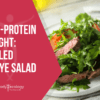3 Ways to Manage Whooping Cough in Children
Whooping cough, or pertussis, is a serious bacterial infection.
It is estimated that each year whooping cough claims the lives of nearly 300,000 people.(1) Children are most likely to be seriously affected by pertussis, and of the children that are affected, infants under one year old are most likely to die from infection.
According to reports, whooping cough is the only disease in the United States that is both preventable by vaccine and associated with increasing deaths each year.
Many schools are recommending healthy children take antibiotics if there is an outbreak of whooping cough in their school. Prophylactic antibiotic treatment, which is a course of antibiotic therapy when there is no infection, can damage the immune system. This is especially true in infants, who are still developing a strong inner ecosystem.
The United States began vaccinations for whooping cough back in the 1940s. With many other infectious diseases, vaccinations proved effective at drastically reducing the risk of infection. While this has been the case with pertussis, the United States has seen a recent rise in incidence.
Immunization against whooping cough is contained in the DPT vaccine, which also delivers immunization against diphtheria and tetanus. The DPT vaccine is an epicenter of much of the controversy that currently surrounds vaccinations.
- In the 1970s, parents began reporting dramatic mood and cognitive changes in their children after receiving the DPT vaccine.
- Normal side effects of the vaccination are fever and soreness at the injection site.
- According to parents, side effects in some children have been high fever, seizures, and brain damage.
- In 1982, a documentary called “DPT: Vaccine Roulette” made its way to mainstream television. Many parents reported that seeing this documentary was the first time they had received an explanation for the changes that they witnessed in their child after immunization.
- After enough lawsuits, negative press, and vaccine manufacturers going out of business, in 1986, Congress passed the National Childhood Vaccine Injury Act (NCVIA). The NCVIA is a system meant to compensate those who are adversely affected by vaccines.
 Recognizing the 3 stages of whooping cough can prevent a serious infection from developing in your child. You can also boost their immune system to fight infection with a low sugar diet and plenty of fermented vegetables.
Recognizing the 3 stages of whooping cough can prevent a serious infection from developing in your child. You can also boost their immune system to fight infection with a low sugar diet and plenty of fermented vegetables.The DPT/DTaP vaccine does not guarantee total protection against whooping cough.
Doctors and pediatricians recommend that parents vaccinate their child and give antibiotics to those who are high-risk, such as infants.
In spite of both of these preventative measures, children who have received vaccinations and antibiotic therapy are still showing up with whooping cough. While this sort of situation is rare, it does mean that vaccination and antibiotic treatment does not guarantee the prevention of whooping cough.
For some parents, the controversy surrounding vaccinations and antibiotic therapy can seem almost impossible to sort through. Depending on the health of the child, vaccination may seem a bit like jumping out of the frying pan and into the fire.
Fortunately, there are ways to manage a possible whooping cough infection:
1. Diagnosis. This is the job of your doctor. Doctors, in spite of their training, can make mistakes.
This is why it is important for every parent to know the 3 stages of whooping cough:
- Stage 1 lasts for up to two weeks. There is generally low-grade fever, runny nose, sneezing, and mild cough.
- Stage 2 can range anywhere from one to six weeks. During this stage, there are severe bouts of coughing, followed by a “whooping” sound. During this stage, there may be need for hospitalization.
- Stage 3 is the recovery stage and can last for up to three weeks. This is when coughing episodes subside and eventually disappear.
2. Diet. A diet that is low in sugar and high in immune-boosting foods like fermented vegetables will naturally protect your child from any infection, including whooping cough. A low-sugar diet also means limiting refined grains and complex carbohydrates. Remember that most of all, your child follows your lead.
If you have an infant, diet applies here as well: infants do best with breast milk, period. Adding formula to an infant’s diet for extra nutrition only creates more stress for a still-developing system.
Try giving your infant or your child a little juice from a batch of fermented vegetables or a teaspoon of InnergyBiotic. This can safely and gently inoculate the gut with friendly and immune-boosting bacteria.
3. Chinese Medicine. Administering Chinese herbs is not something that you can take into your own hands. A formula can be created by a licensed acupuncturist/Oriental Medicine Doctor.
Chinese formulas for pertussis are structured according to the child’s constitution, symptoms, and stage of illness. If you are able to find a practitioner that you trust, Chinese herbal therapy can be extraordinarily effective in treating infectious disease.
In 2003, the World Health Organization formally recognized the therapeutic benefits of acupuncture on whooping cough symptoms.
What to Remember Most About This Article:
Whooping cough, otherwise known as pertussis, is a serious bacterial infection that poses a special risk to children under one year old. However, the DPT vaccine used to treat whooping cough has caused a number of severe side effects in children, including high fever and even brain damage. For this reason, many parents are still reluctant to use the new DTaP vaccine to safeguard their child against whooping cough.
You can protect your child’s health by understanding the 3 stages of whooping cough, boosting their immunity with a diet low in sugar and rich in fermented foods, and considering Chinese medicine performed by a licensed Oriental Medicine Doctor as an alternative treatment.
Product Recommendations:
- [product id=”1″]
- [product id=”169″]
REFERENCES:
- Silvana Bettiol , et al. Symptomatic Treatment of The Cough in Whooping Cough. Cochrane Database System Review. 2010: 1; CD003257.








